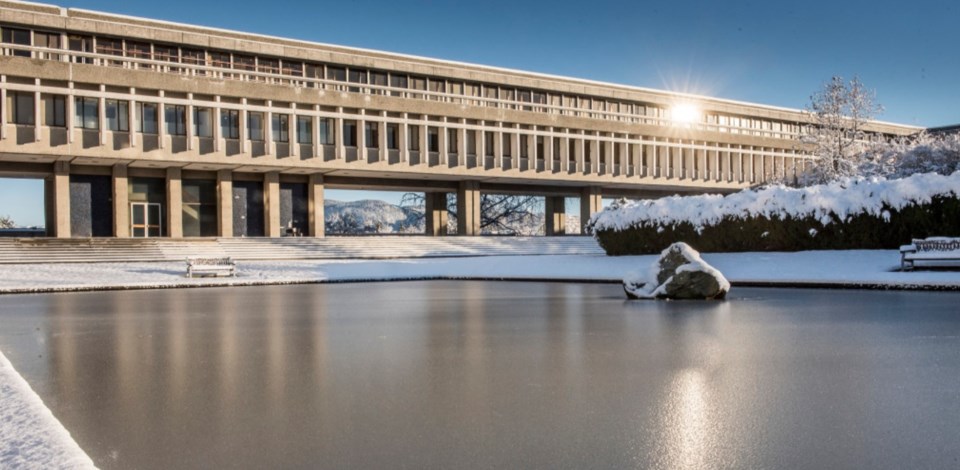Students, faculty and staff at Simon Fraser University are walking out of classes today (Jan. 24), to protest the full return to in-person learning.
The protest began at 11 a.m. this morning and is expected to go until 12.30 p.m. across the university.
On Dec. 23, following many other universities, SFU announced a temporary two-week shift to remote learning from Jan. 10 to 23.
The extremely transmissible Omicron variant was the driving factor for institutions to move to online learning while B.C. saw record-breaking daily case counts and record hospitalizations.
"SFU has had a very safe and successful return to campus," the school said in a statement on Dec. 23.
"Safety remains our top priority, and includes the mental health and wellness of our students, faculty and staff.
"This brief shift to some of our learning and teaching will provide time to learn more about the situation and consider additional tools to support a full in-person return."
Students, faculty and staff returned to in-person classes today.
"The student walkout is a decentralized action of students, faculty and staff in solidarity," a media statement reads.
"Students across the country stand firmly in solidarity with all immunocompromised, disabled, neurodivergent, and COVID-19 anxious students and workers who reject the irresponsible and reckless eugenicist and ableist policy makers within university and government.
"It is those policy makers who are okay with them dying due to COVID-19 in defense of "going back to normal" regardless of deaths and long term effects of COVID-19. We stand in solidarity with all students, staff and faculty, and will continue to do so until their demands have been fully met. Our academic institutions are complicit in this violation of students’, faculty, and staff’s rights to a safe learning environment and workplace."
The statement says in any response to learning, the following demands must be met:
- Extension of remote learning, until safe to return in-person
- Permanent hybrid learning
- Free N95 masks
- Rapid testing on 3 campuses
- Extension of tuition and course withdrawal deadlines
- Consulting student unions, labour unions and faculty unions and meeting their demands for safety
"Simon Fraser University is the largest post-secondary institution in BC to not extend their online learning and is not prioritizing student safety.
"In its release it continues to pit the mental health of students against the anxiety that students feel during in-person. We call for a responsible, involved and compassionate approach to COVID-19 that centres safety for the community on campus."
Last week, the SFU Disability and Neurodiversity Alliance also called out the school, saying the decision to go back to in-person was 'irresponsible."
"We believe that this plan is not only ill-advised but deeply ableist and ageist towards those members of the SFU community who have additional risk factors for COVID-19," the statement released on Jan. 17 states.
"No one is free from the risk of COVID-19, even the Omicron variant. While initial reports suggest that the Omicron variant is milder than past variants of COVID, that does not make it a mild condition.
"It is a far more transmissible variant, making it extremely dangerous to those who are at high risk from COVID. Those members of our community who are immunocompromised, have pre-existing health conditions or are older should not have to decide between their lives and their education."
The group also says the high transmission of Omicron makes it dangerous, especially to those who are disabled, because of its strain on the health care system.
"SFU’s plan has inadequate safety measures, instead advising staff and students to prepare to get COVID rather than avoid it. This level of risk is irresponsible at best and eugenicist at worst. It operates on the assumption that all SFU students, staff and faculty are young, healthy and without any pre-existing conditions."
The statement released by the alliance says the group is calling on the university to implement the following policies:
- Immediately change the policy of in-person teaching to provide a mix of in-person, online, and hybrid classes
- Delay a full return to in-person classes until 90% of SFU community members have access to a third vaccine shot and transmission rates are little to none
- Support and assist instructors in setting up as many options as possible for their courses, including live-streamed lectures, lecture recordings, and counting virtual forms of engagement (e.g. posting on Canvas discussion board) as participation
- Support and assist instructors in implementing best practices for accessibility and universal design in their courses
- Expand online course offerings
- Provide financial aid via bursaries for students facing barriers to technology and students impacted by COVID in their families and households
- Extend course drop and refund deadlines
- Extend tuition payment deadline
- Increase library loans of laptops and other electronic devices for learning
- Strengthen protection measures for in-person and hybrid classes, including ASHRAE standard ventilation for all open rooms and closure of rooms that do not meet standards, restriction of class sizes to permit adequate physical distancing, distribution of N95 and equivalent masks, on-campus COVID testing and vaccination
- Begin a wide consultation with the student body, faculty, staff, and other SFU community members
- Ensure these consultations prioritize marginalized community members and their representative groups, including disabled and neurodivergent students, BIPOC students, 2SLGBTQIA+ students, international students, students who are parents, students who are essential workers, janitorial staff, and those in high-risk groups for adverse COVID outcomes
- Publicize the findings of these consultations and commit to improving or changing policy to support the needs of a diverse community

